Playing Scrabble Can Boost Visual Cognition 20%!
 Competitive scrabble players are able to recognize words 20% faster than non scrabble players according to new research from the University of Calgary. More importantly, they found it enhances the cognition you use to recognize words:
Competitive scrabble players are able to recognize words 20% faster than non scrabble players according to new research from the University of Calgary. More importantly, they found it enhances the cognition you use to recognize words:
“The average literate adult relies on three components to process and read a word: sound, spelling and meaning,” says Penny Pexman, professor of Psychology. “When we studied the Scrabble players, we found that there is significant flexibility in the tools they use to read words and that it can include the orientation of the word as well.”
Playing games is one well-known strategy for improving brain function and cognitive performance. Many posts on the Next Brain Blog cover the topic. Trouble is skills developed by game playing are often margin improvements and don’t transfer into new domains. That makes the finding about play Scrabble significant – 20% improvement and it transfers!
I am interested to hear from readers that are getting significant and transferable brain boosts from other games.
Categories: Lifestyle, Memory and Learning, Perception Tags: games
Stimulate Your Photosensitive Brain
 A group of researchers in Finland have demonstrated that our brain is photosensitive. Brain function changes when you shine light on it. Their research has shown that brain light therapy can improve cognitive function, mental energy and mood. The effects seem significant and long lasting.
A group of researchers in Finland have demonstrated that our brain is photosensitive. Brain function changes when you shine light on it. Their research has shown that brain light therapy can improve cognitive function, mental energy and mood. The effects seem significant and long lasting.
You can shine light directly on some of the photosensitive regions of your brain through the ear canal. A consumer product, Valkee, does exactly that with light-emitting ear plugs. According to the researchers you need to use it for 10 minutes a day to see results.
Interested to hear from readers that have used the Valkee or some other form of light-based brain stimulation.
Categories: Other Tags:
Combine Techniques to Double Brain Boost
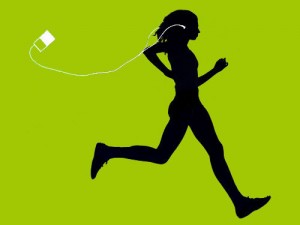 In the Next Brain blog we review techniques that hold good promise for improving brain function and cognitive performance. Many of the techniques involve lifestyle choices, for example how you eat, sleep, interact with others and exercise; others involve major development efforts such as learning to play a musical instrument, second language or how to reason critically; still others are specialized, for example neuro-feedback, brain training, mindfulness and yoga. One concern I often hear is that many techniques produce small or temporary effects. This is true. One way to combat that is to combine them for greater effect.
In the Next Brain blog we review techniques that hold good promise for improving brain function and cognitive performance. Many of the techniques involve lifestyle choices, for example how you eat, sleep, interact with others and exercise; others involve major development efforts such as learning to play a musical instrument, second language or how to reason critically; still others are specialized, for example neuro-feedback, brain training, mindfulness and yoga. One concern I often hear is that many techniques produce small or temporary effects. This is true. One way to combat that is to combine them for greater effect.
For example, researchers at Ohio State University studied the impact of combing aerobic exercise and music, two well-known brain boosters, to find:
“The improvement in verbal fluency test performance after listening to music was more than double that of the non-music condition.”
Listening to music while you workout will significantly improve your score on a standardized cognitive test. Subjects in the study that listened to the music also reported feeling better and a more positive mood.
I am looking for additional research on combination effects. If you have a reference or personal story you would like to share please reply to this blog post.
Categories: Lifestyle, Music and Audio Tags:
Build a Better Brain by Consciously Listening
The listening and sound expert Julian Treasure has an excellent 8 minute TED Talk video on why we are losing our ability to listen and what to do about it. Of special interest to readers of the Next Brain Blog are the five techniques he offers to improve your ability to listen consciously. These include:
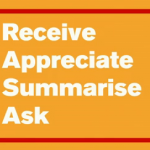 Actively listen to others by practicing RASA or receive, appreciate, summarize and ask questions.
Actively listen to others by practicing RASA or receive, appreciate, summarize and ask questions.- Enjoy 3 minutes of silence or quiet per day to help reset or re-calibrate your listening.
- Count the channels or sources of sound in a noisy environment. For example, walking down a city street you receive sound from a dozen sources including car horns, nearby conversation, buses and so on.
- Change your listen position by adjusting the filters that shape how you hear including for example, expectations and empathy.
- Listen to the hidden choir around you. This involves savoring ordinary sounds, for example hearing the symphony in your tumble dryer.
These five techniques are simple but practicing them will with time transform how you consciously listen. Hearing the world is a key to improved cognitive performance.
Interested to hear from readers that practice specific techniques of conscious listening. What techniques do you use? What have you heard that the rest of have not?
Categories: Lifestyle, Mental Focus, Perception, Training Tags:
Use Your Finger to Crank Your Brain
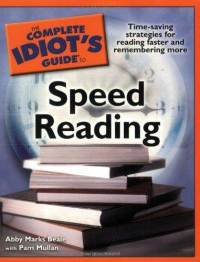 I read faster from paper than I do on a computer screen. With paper I can use my finger to guide my eyes. A well-known speed reading technique, guiding and pacing, lowers the load on your visual system and helps avoid skipping back and other distractions. It is simple and it works. Try it out.
I read faster from paper than I do on a computer screen. With paper I can use my finger to guide my eyes. A well-known speed reading technique, guiding and pacing, lowers the load on your visual system and helps avoid skipping back and other distractions. It is simple and it works. Try it out.
With practice you can drop your finger and still get the effect because your eyes have been retrained. I get some of this effect but am still fastest with good comprehension when I use my finger.
This is just one of the techniques covered in the excellent book, The Complete Idiot’s Guide to Speed Reading.
If you don’t already use these techniques, several weeks of practice will produce a big jump in you reading speed and will likely improve comprehension as well.
Reading speed is important. The difference between a slow reader and an excellent reader means 3 books per week if you read an hour a day.
Very interested to hear from readers that have simple techniques (e.g. use of your finger) to crank your reading speed or other cognitive performances.
Categories: Books, Memory and Learning, Mental Focus, Perception, Training Tags: processing speed, speed reading
Hard Evidence that Meditation Changes our Brains
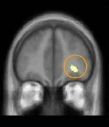 Mediation and mindfulness training is a frequent topic on the Next Brain Blog. Over the last several years we have seen studies that show a few weeks of meditation can produce measurable improvement in cognitive function and long-term practice actually makes certain brain regions larger. Now researchers at UCLA report in, Is Meditation the Push-Up for The Brain?:
Mediation and mindfulness training is a frequent topic on the Next Brain Blog. Over the last several years we have seen studies that show a few weeks of meditation can produce measurable improvement in cognitive function and long-term practice actually makes certain brain regions larger. Now researchers at UCLA report in, Is Meditation the Push-Up for The Brain?:
“… that people who meditate also have stronger connections between brain regions and show less age-related brain atrophy. Having stronger connections influences the ability to rapidly relay electrical signals in the brain. And significantly, these effects are evident throughout the entire brain, not just in specific areas.”
Changing the physical structure of the brain to preserve and enhance function and cognitive performance makes meditation a high-value training technique.
Interested to hear from readers that use any form of meditation. What technique do you use? How long have your practice? What Next Brain benefits do you see?
Categories: Cognitive Decline, Memory and Learning, Older Adult, Training Tags: meditation, mindfulness
Laughter Primes Creative Problem Solving
 The health benefits of regular laughter are broadly known. Check out Laughter is the Best Medicine for a quick review.
The health benefits of regular laughter are broadly known. Check out Laughter is the Best Medicine for a quick review.
What is not so widely known, is that laughter can also immediately boost brain function and cognitive performance, especially in the area of creativity. For example, one study showed that watching 15-minute comedy video leaves you in a significantly more hopeful state. Being hopeful enables creative thinking.
Being open to laughter, generating chuckles and getting the full effects from a good laugh are all skills we can learn. One recent trend in this area is Laughter Yoga. In this approach you practice an exercise that combines laughing for no specific reason with Yoga-based breathing techniques. Not sure if it achieves the same effects as traditional laughter but it appears to. Perhaps it is even better!
Check out this video from the BBC on Laughter Yoga in London and you be the judge.
Interested to hear from readers that do laughter yoga or use other techniques to induce laughter on a regular basis for the purposes of health and improved cognitive performance.
Categories: Problem Solving, Training Tags: Yoga
What is Your Brain Performance Index?
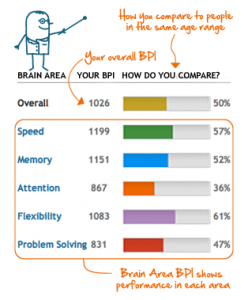 Lumosity, a leader in the growing field of cognitive training, has introduced the brain performance index. The index is an empirical and comparative measure of your ability to focus and sustain attention, processing speed, memory, problem solving skill and mental flexibility. You can set up an account and build your profile for free. If you want to know how you compare to others in your age group you need to subscribe.
Lumosity, a leader in the growing field of cognitive training, has introduced the brain performance index. The index is an empirical and comparative measure of your ability to focus and sustain attention, processing speed, memory, problem solving skill and mental flexibility. You can set up an account and build your profile for free. If you want to know how you compare to others in your age group you need to subscribe.
Like other instruments that assess your cognitive abilities, the brain performance index (BPI) gives insights into strengths and weaknesses. It should help you define goals for working on your next brain.
Interested to hear from readers that use the BPI or other assessment instruments to set goals for how best to achieve peak cognitive performance.
Categories: Memory and Learning, Mental Focus, Problem Solving, Software Tags: brain fitness
Student Reading Skill Doubles in 24 Days
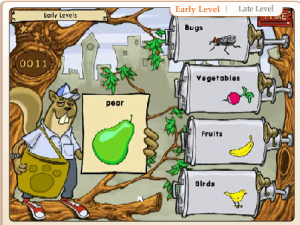 Scientific learning just published the results of a controlled study on Fast ForWord Reading Level 1. This is brain training software designed to boost the abilities of early readers such as students in first and second grade. It build skills with phonemes (sounds) and images, vocabulary knowledge and decoding and sequencing skills and even motivation for reading.
Scientific learning just published the results of a controlled study on Fast ForWord Reading Level 1. This is brain training software designed to boost the abilities of early readers such as students in first and second grade. It build skills with phonemes (sounds) and images, vocabulary knowledge and decoding and sequencing skills and even motivation for reading.
In the study over 200 first and second graders trained 48 minutes per day for 24 school days. When tested against a control group they scored nearly twice as well.
An impressive result especially since it is focused on the fundamental skill of phonological awareness. This involves recognizing, taking apart, adding and moving sounds. It supports high performance in both reading and writing.
Interested to hear from others that use specific techniques to build reading skills in children.
Categories: Child, Perception, Software, Training Tags: speed reading
Seek Novelty to Expand Cognitive Potential
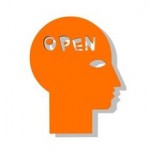 In the Next Brain blog we explore evidence-based ways to improve brain function and enhance cognitive performance. That is why the recent article in Scientific American on 5 Ways to Enhance your Cognitive Potential caught my eye. The author does a good job of reviewing the science behind fluid intelligence and argues we can actually increase IQ through targeted development efforts. There are five ways that include seek novelty, challenge yourself, think creatively, do things the hard way and network. Let’s take a closer look at seeking novelty or being open to new experiences. It is a practice with a clear impact on our brains (plasticity, dopamine for motivation, etc.) and you can build into into everyday activities.
In the Next Brain blog we explore evidence-based ways to improve brain function and enhance cognitive performance. That is why the recent article in Scientific American on 5 Ways to Enhance your Cognitive Potential caught my eye. The author does a good job of reviewing the science behind fluid intelligence and argues we can actually increase IQ through targeted development efforts. There are five ways that include seek novelty, challenge yourself, think creatively, do things the hard way and network. Let’s take a closer look at seeking novelty or being open to new experiences. It is a practice with a clear impact on our brains (plasticity, dopamine for motivation, etc.) and you can build into into everyday activities.
The authors recommend:
“Always look to new activities to engage your mind—expand your cognitive horizons. Learn an instrument. Take an art class. Go to a museum. Read about a new area of science.”
Learning an instrument and taking an art class are excellent suggestions as they have proven effects on building a number of cognitive skills. We have discussed this elsewhere on the Next Brain Blog. See for example Music Lessons Offer Life Long Cognitive Benefits.
Learning art or music is a big investment. What else can we do?
 One of my favorite ways to stimulate novelty is to review web sites on topics outside my normal areas of interest. YouTube videos and Ted Talks can really get the novelty factor flowing fast.
One of my favorite ways to stimulate novelty is to review web sites on topics outside my normal areas of interest. YouTube videos and Ted Talks can really get the novelty factor flowing fast.
For example, watch the first 4 minutes of the video below on brain magic. Be sure to follow along with the audience. I guarantee you will get a good jolt of novelty!
Interested to hear from readers that have made novelty seeking a habit. What specifically do you do?
Categories: Other Tags:
